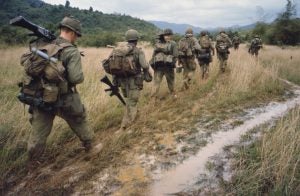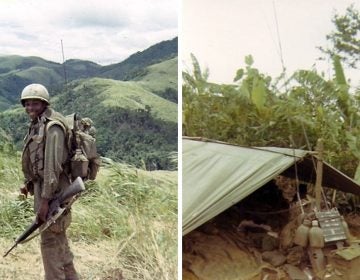Five ways Hollywood looks at Vietnam [video]
As Ken Burns turns his documentary lens on Vietnam, WHYY’s Patrick Stoner examines five ways Hollywood has explored the war.
This story is part of a WHYY series examining how the United States, four decades later, is still processing the Vietnam War. To learn more about the topic, watch Ken Burns and Lynn Novicks’ 10-part documentary “The Vietnam War” running through Thursday, Sept. 28 on WHYY-TV.
—
Out of all the movies made about the Vietnam War, five in particular represent the way Hollywood presents the war and issues surrounding it, said Patrick Stoner, host of WHYY’s “Flicks.”
“I’m approaching it from a very specific angle … Five different ways to approach Vietnam, and how did that change over a period of time,” he said.
‘The Deer Hunter’
The first film in our list is 1978’s “The Deer Hunter.” When it was released, the war was very fresh in the minds of Americans, even though the way it would impact the culture still wasn’t fully understood.
“It was about a group of people who were one way at the beginning of the movie, and who went through a very dramatic episode involving Russian roulette as prisoners of war. They came back completely changed, and that was true of so many people in America in 1978,” Stoner said.
“The Deer Hunter” would go on to win five Oscars, including best picture. It also helped make a name for Christopher Walken, who won an Oscar for best supporting actor.
‘Apocalypse Now’
One year later, Francis Ford Coppola’s “Apocalypse Now” debuted with a very different take on Vietnam. Fresh off the success of the first two “Godfather” movies, Coppola had free rein to make the movie how he wanted.
“‘Apocalypse Now’ basically shows you what it would be like if war was all about bureaucracy,” Stoner said. “It was a surreal expression of what happens when it’s not people that are making the decisions, but something bigger than themselves controlling them all, and nobody knows where it’s going to go.”
“Apocalypse Now” won just two Oscars, for cinematography and sound, but it was nominated in a number of categories, including best supporting actor for Robert Duvall.
‘Platoon’
By the mid-1980s, Oliver Stone took his turn at telling the story of Vietnam with 1986’s “Platoon.” Stone, who opposed the war, told the story of Vietnam as someone who personally fought in the war. Platoon gave viewers a sense of what it was like on the ground, where it was unclear who was firing at whom and where those bullets were coming from. His opposition to the war also informed the way he told the story.
“It was also a tale of good and evil, the two sergeants, and they of course were [Willem] Dafoe and [Tom] Berenger,” Stoner said. “One was somebody who knew how to handle themselves in war and was good at killing, but maintained his soul, and one who had lost his soul. So at the end of the day, you were looking at it as a morality tale.”
‘Good Morning, Vietnam’
Robin William’s “Good Morning, Vietnam” was a totally different look at the Vietnam War, through the eyes — and voice — of a disc jockey assigned to U.S. Armed Services radio. Released in 1987, the comedic film was, at the time, considered somewhat of risk.
“I was there on the ground when Paramount Pictures was trying to figure out if they had something acceptable or not. This was going to be a comedy about Vietnam, even though it would have serious elements in it,” Stoner said. “Humor is a great palliative when you’re trying to deal with war. It’s easier to watch a comedy about something like this than it is to just reveal the horrors to you, so you could just let yourself relax into it.”
‘Forrest Gump’
In 1994, Tom Hanks’ Forrest Gump found himself in some of the most important moments in modern U.S. history including the Vietnam War. “Forrest Gump” presented the war to a new generation of Americans who were less familiar with the emotion and pain of Vietnam. Through Hanks’ character, it also put an “innocent” into the war zone for viewers to consider how war changes everyone, both those who fight, and those back home.
“The world as it is, what would it be like if we came to it as an almost completely blank slate. Would we even influence anything?” said Stoner. “Well, in the fable that you’re watching, yes, you do influence it, but in real life, maybe we all come to war beginning as innocents and come out of war changed. If we come out of it all.”
WHYY is your source for fact-based, in-depth journalism and information. As a nonprofit organization, we rely on financial support from readers like you. Please give today.






